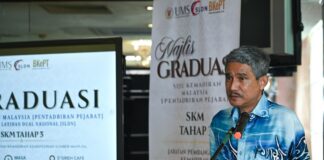TENOM: Sabah Barisan Nasional (BN) chairman, Datuk Seri Panglima Bung Moktar Radin, emphasised that there are no concerns about any party in the state not recognising the formation of the Federal Village Development and Security Committee (JPKKP) in Sabah, as it has received official recognition from the Federal Unity Government.
In this regard, he urged those who have received their appointment letters as JPKKP chairpersons to fulfil their duties with integrity and demonstrate their capabilities and responsibilities within their respective villages.
“Embrace the responsibilities and trust bestowed upon you, and maintain your focus. Even if the state government does not recognise this appointment, it is the Federal Government (Unity) that has validated your positions,” he stated.
Bung Moktar made these remarks during the official handover of appointment letters for the JPKKP (Madani Village Community) for the Kemabong and Melalap constituencies at the Datuk Seri Panglima Antanom Community Hall on Saturday.
Also present were the Political Secretary to the Deputy Prime Minister, Datuk Jamal Nerubi, Melalap Assemblyman Datuk Peter Anthony, State Umno Treasurer Datuk Seri Dr Salleh Said Keruak, Tenom Umno Division Chief Datuk Raimee Unggi, and Tenom District Kemas Officer Riyanti Mikail, along with Giat Mara Tenom Manager Didie Norhazrilah Latif.
According to Bung, who is also the Sabah Umno Chief, the establishment of the JPKKP position under the Ministry of Rural Development and Regional (KKDW) in the state aims to balance power at the district level, especially since grassroots leaders such as district heads, Native chiefs, village heads, and mukim developers from Umno/BN have been replaced or had their services terminated, leading to a monopoly by a single party.
“In the State Assembly, during the speeches of the state’s key leaders, there is an acknowledgement of support for the concept of a Unity government. However, this is not just about unbalanced appointments; the constituency represented by the elected representative from Umno/BN does not receive annual allocations,” he said.
In this regard, according to Bung from Umno/BN Sabah, discussions with the central government, especially KKDW, are necessary to establish JPKKP in Sabah. This aims to balance development needs based on the population density and geography of Sabah, particularly in rural areas that still require attention for development and improving the economic status of rural residents.
“We believe that having JPKK in every village in this state can further enhance development and improve the economic status of rural communities. Even though the state government has recognised that the people of Sabah are no longer below the poverty line, there are still rural residents who need support,” Bung explained.
Bung, who is also the Member of Parliament for Kinabatangan, added that with an annual allocation of RM100,000 for each JPKKP in the state, these funds can be used to improve the quality of life and economy of village communities. This can include small projects and economic programs, such as organising sewing courses and craft food initiatives to provide skills for residents to enter business and enhance their economic status.
“After this appointment, Kemas will provide briefings or courses to align the functions and roles of JPKK, especially for planning and implementing projects and programs in the villages while encouraging local community involvement,” he said.


